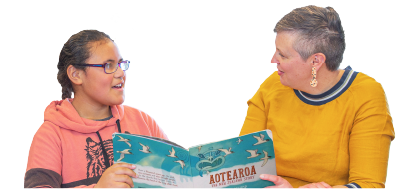Being Samoan
Show video transcript
Title slide: Being Samoan
Eirene Pulepule, Student, Kelston Girls’ College, Auckland, facing camera
I never knew I was a Samoan until I hit seventh grade, cause, so in primary I was surrounded with like a lot of, like, white people and there was, like there was no like Pasifika teachers around. So I just felt like I was one of them as well until I hit 7th grade like there was a lot of it just like the community, around the school it completely changed and there was more like brown people, like more people that I familiarised myself with and ever since I started at Kelston Intermediate like I started to like value my culture more. And there's this festival called Kelley Fest every year that we have, and every week we at least practice like there's a different culture groups and like you learn more about the culture, not just the culture itself but the language and the values that it has. And I reckon that now that I'm starting to embrace my culture and it's never too late to embrace your culture.
Glenda Etelei, Student, Kelston Girls’ College, Auckland, facing camera
Our Samoan culture relates heavily to how we are brought up and how we are raised and what morals and values that you carry to the future and the influence you have on your younger generation.
Rathey Lataimoega, Student, Kelston Boys’ College, Auckland, facing camera
So at home we basically speak Samoan all the time. Our parents would tell us not to let go of the language and that, which means that like, especially saying that just to be proud of it. Even though we came from the island it doesn't mean that you know we know all about the culture and the language so yeah.
Eirene Pulepule, Student, Kelston Girls’ College, Auckland, facing camera
The number one is respect. Respect your elders, respect your peers no matter what you do because respect wherever you go respect follows you as well as your last name. So you carry your family wherever you go. So the way you approach someone within the community or within the world it's like a sign saying that like, you're respecting them and also like you're carrying your family as well. So like if they see you again and they'll be like ‘Hey, look, there goes like Etele or that's Glenda or that's Eirene and her last name’s Pulepule.’ They'll all recognise that when they see another person or relative that has the same last name, they'll recognise that that family has that type of value that likes to respect people.
This video is about Samoan identity, language, and culture and being Samoan at school. One learner shares that she didn’t identify as Samoan in primary school as the environment was dominated by the white culture she felt she was one of them. She found her identity at school in Year 7 when she moved to a school where there is a strong community presence and diversity is recognised. Others spoke of the importance of culture, connections, language and the value of respect. Samoan identity at school brings pride, confidence, a sense of belonging, and the significance of a family name.
Reflections for individual teachers
As you watch this video, think about the Samoan learners in your classroom and reflect on your own identity.
- Ask your Samoan learners if they see part of themselves reflected in the school environment and the classrooms as they walk through the school gate.
- How are you sharing and incorporating your background, identity, culture, and what matters the most to you in your teaching practice to allow your learners to relate to your personal story? What approaches do you use to enable your learners to share their own identity, culture, background and what matters the most to them?
- How do you connect with your Samoan learners to understand who they are, where they come from, their lives outside the classroom? What can you do to help them retain their Samoan identities and keep their culture active in your class?
- How do you invite their parents and families to share some of their own Samoan cultural knowledge and strengths, to use as a foundation for effective teaching, and to build on your own cultural awareness and understanding?
Reflections for staff or departments
As you watch this video, as a staff member or member of a department team, think about how your school is meeting the needs of your Samoan learners.
- How does your school build on the teachers’ knowledge of Samoan culture to meet the needs of your Samoan learners?
- Think about ways your school can challenge your teaching staff to look at a curriculum area of their choice and how they can incorporate the Samoan language and culture into it.
- Think about examples of appropriate contexts for the Samoan language and culture, how have you made improvements to school systems and processes to develop a rich classroom environment and appropriate contexts for learning?
Ask your staff to walk around the school and classroom environments to see if they can identify Samoan tapa, artifacts, displays of Samoan language and culture, and any other resources that relate to Samoan learners in your school.


